Robert hooke 1665 - Study guides, Class notes & Summaries
Looking for the best study guides, study notes and summaries about Robert hooke 1665? On this page you'll find 89 study documents about Robert hooke 1665.
Page 4 out of 89 results
Sort by
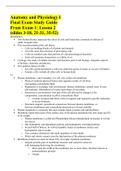
-
Anatomy and Physiology I Final Exam Study Guide From Exam 1: Lesson 2 (slides 3-18, 21-31, 35-52) Introduction
- Exam (elaborations) • 40 pages • 2023
-
- $13.49
- + learn more
Anatomy and Physiology I Final Exam Study Guide From Exam 1: Lesson 2 (slides 3-18, 21-31, 35-52) Introduction • 1665 Robert Hooke inspected thin slices of cork and found they consisted of millions of small, irregular units • This research produced the cell theory o Cells are building blocks of all plants and animals o All cells come from division of preexisting cells o Cells are smallest units that perform all vital physiological functions o Each cell maintains homeostasis at cellular...
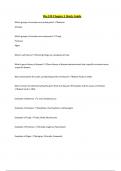
-
Bio 150 Chapter 1 Study Guide
- Exam (elaborations) • 4 pages • 2024
-
Available in package deal
-
- $9.99
- + learn more
Bio 150 Chapter 1 Study Guide Which groups of microbes are prokaryotes? Bacteria Archaea Which groups of microbes are eukaryotes? Fungi Protozoa Algae What is cell theory? All living things are composed of cells. What is germ theory of disease? Germ theory of disease demonstrates that a specific microbe causes a specific disease. Who observed the first cells, and developed the cell theory? Robert Hooke in 1665. Who is known for demonstrating the germ theory of disease? (Postu...
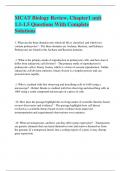
-
MCAT Biology Review, Chapter1 unit 1.1-1.5 Questions With Complete Solutions
- Exam (elaborations) • 55 pages • 2024
-
- $13.99
- + learn more
MCAT Biology Review, Chapter1 unit 1.1-1.5 Questions With Complete Solutions 1. What are the three domains into which all life is classified, and which two contain prokaryotes? - The three domains are Archaea, Bacteria, and Eukarya. Prokaryotes are found in the Archaea and Bacteria domains. .1. What is the primary mode of reproduction in prokaryotic cells, and how does it differ from eukaryotic cell division? - The primary mode of reproduction in prokaryotic cells is binary fission, which ...

-
Bio 150: Chapter 1 Study Guide with 100% Complete Solutions
- Exam (elaborations) • 4 pages • 2024
-
- $10.49
- + learn more
Bio 150: Chapter 1 Study Guide with 100% Complete Solutions Which groups of microbes are prokaryotes? - Answer️️ -Bacteria Archaea Which groups of microbes are eukaryotes? - Answer️️ -Fungi Protozoa Algae What is cell theory? - Answer️️ -All living things are composed of cells. What is germ theory of disease? - Answer️️ -Germ theory of disease demonstrates that a specific microbe causes a specific disease. Who observed the first cells, and developed the cell theory? - A...

-
Anatomy and Physiology I Final Exam Study Guide From Exam 1: Lesson 2 (slides 3-18, 21-31, 35-52)
- Exam (elaborations) • 40 pages • 2023
-
- $12.49
- + learn more
Anatomy and Physiology I Final Exam Study Guide From Exam 1: Lesson 2 (slides 3-18, 21-31, 35-52) Introduction • 1665 Robert Hooke inspected thin slices of cork and found they consisted of millions of small, irregular units • This research produced the cell theory o Cells are building blocks of all plants and animals o All cells come from division of preexisting cells o Cells are smallest units that perform all vital physiological functions o Each cell maintains homeostasis at cellular...
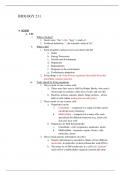
-
BIOLOGY 211
- Exam (elaborations) • 5 pages • 2023
-
- $14.49
- + learn more
BIOLOGY 211 A. 8/24/20 a. Life i. What is biology? 1. Greek roots: "bio" = life, "logy" = study of 2. Textbook definition: "...the scientific study of life" ii. What is life? 1. Some properties and processes associated with life a. Order b. Energy Procession c. Growth and development d. Regulation e. Reproduction f. Response to the environment g. Evolutionary adaptation 2. living things = all of the diverse organisms descended from that unicellular common ancestor iii. Tra...
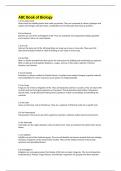
-
ABC Book of Biology
- Exam (elaborations) • 3 pages • 2024
-
- $9.59
- + learn more
ABC Book of Biology A is for Amino Acid Amino Acids are building blocks that make up proteins. They are composed of carbon, hydrogen and oxygen and nitrogen and side chains. Combinations of 20 molecules that make up proteins. B is for Bacteria Bacteria are one of the six kingdoms of life. They are unicellular microorganisms lacking organelles and a nucleus. Some can cause disease. C is for Cell Cells are the basic unit of life. All living things are made up of one or more cells. Th...
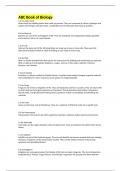
-
ABC Book of Biology
- Exam (elaborations) • 3 pages • 2024
-
- $10.39
- + learn more
ABC Book of Biology A is for Amino Acid Amino Acids are building blocks that make up proteins. They are composed of carbon, hydrogen and oxygen and nitrogen and side chains. Combinations of 20 molecules that make up proteins. B is for Bacteria Bacteria are one of the six kingdoms of life. They are unicellular microorganisms lacking organelles and a nucleus. Some can cause disease. C is for Cell Cells are the basic unit of life. All living things are made up of one or more cells. Th...

-
Microbiology Exam 1 study guide answers Quizzes Answered Correctly!!
- Exam (elaborations) • 13 pages • 2024
-
- $10.49
- + learn more
Microbiology Exam 1 study guide answers Quizzes Answered Correctly!! What is the definition of microbiology? is the study of microorganisms and their activities. In addition, it also is the study of small living things. Microorganisms are those organisms that are too small to see with the naked eye and include things like bacteria, fungi, and viruses. What kinds of organisms do microbiologists study? Microbiologists study microorganisms. Microbiologists may specialize in the study of dif...
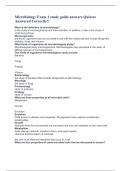
-
Microbiology Exam 1 study guide answers Quizzes Answered Correctly!!
- Exam (elaborations) • 13 pages • 2024
-
- $14.99
- + learn more
Microbiology Exam 1 study guide answers Quizzes Answered Correctly!! What is the definition of microbiology? is the study of microorganisms and their activities. In addition, it also is the study of small living things. Microorganisms are those organisms that are too small to see with the naked eye and include things like bacteria, fungi, and viruses. What kinds of organisms do microbiologists study? Microbiologists study microorganisms. Microbiologists may specialize in the study of dif...

How did he do that? By selling his study resources on Stuvia. Try it yourself! Discover all about earning on Stuvia


